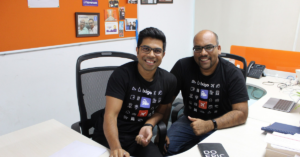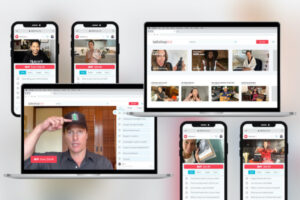Tech Girls Lab in Equals Amsterdam (Image credit: Aline Brunen/Ellevate)
Worldwide less than a third of professionals in technology are women. Over the years, many companies have started well-intentioned initiatives to employ and retain more women. But the root of the problem starts well before a first job. That is why the UN proclaimed this day International Girls in ICT Day.
Gender gap in startup ecosystem
It is as good a day as any to point to the similar gender gap in startup ecosystems. Female founders in the startup ecosystem are a minority. They receive far less funding. And as a female developer or tech professional, you’ll find mostly male colleagues around you.
Has the Dutch workforce mastered all digital skills? Find out
To make sure everyone gets the same opportunities, multiple opportunities popped up for women to break ground in the startup ecosystem. In Amsterdam for instance, you can find accelerators like RISE – Female Hub, networking events like StartupRoulette for women and educational projects like Techionista that all focus on women in tech.
First; the good news
However, the whole idea of starting a career in tech starts well before that. Young girls tend to turn their back on technology early on. The Amsterdam-based VHTO, the knowledge centre of gender diversity in tech, published a white paper (Dutch) detailing the current situation in The Netherlands earlier this year.
There is some good news – representation of women in tech has risen over the past ten years. But on several levels of STEM-focused education, girls are still a minority. And as the white paper claims: “Every time a girl or woman is presented with a choice, the sector loses people.”
Too much bias, too few role models
VHTO identifies four main causes of why women are less inclined to choose or stay in tech. They don’t feel at home in the predominantly male company cultures of tech corporations and struggle to combine work and family more often. But well before they embark on a career in ICT, they experience a strong gender bias and a lack of role models.
To tackle those last two causes, eight girls between the ages of 8 to 12 years old gathered in the female-focused event space Equals Amsterdam last Saturday. They came to learn how to program robots. Dexterity, a platform that offers coding lessons for kids, organised the workshop in collaboration with Ellevate, an Amsterdam-based recruitment agency focused on closing the gender gap. Aline Brunen, co-founder of Ellevate, was there to help out and ask the girls some questions about their projected career path.
>> Read also: These are Amsterdam’s powerhouse female entrepreneurs to watch in 2022 – Part 1
So were these girls looking for a career in tech? Not necessarily. In fact, Brunen found that at this age, they were not looking for a career at all. “I found only one that wanted an engineering career. Another wanted to make cupcakes when she grew up. None of the other girls was thinking about the future. They just wanted me to stop asking questions so they could continue programming their robot, haha.”
Block coding and block designing
And so they did. Divided into two teams, they started using a block coding tool to let several small robots perform simple tasks. Once they were done, they could decorate them with Legos. The grand finale was when the two teams could let their robots wrestle each other. “One group was really creative in decorating their robot. The other was more into adding functionality.”
One could say this indicated an early divide into UI or UX design teams and engineering teams. And that is part of the goal of these workshops. “These workshops are designed to show that the world of IT is more than just engineering. It’s also about giving them an idea of what more you can do in the world of tech.”
Female role models
That includes a small introduction by Brunen and Teresa Sánchez Rico from Dexterity. Seeing these role models, women with successful careers in tech, helps normalise the idea that girls belong. “Seeing your mom being a programmer helps”, says Brunen. “You can see those young girls are certainly interested in tech. But at a certain age, there’s not enough support so they lose track of those ambitions. That is how the gender gap starts.”
That’s a tragic loss for the tech sector, says Brunen. There’s a lot of natural talent that remains untapped, she sees. “Sometimes you see girls that are so smart. They just open up a laptop and instantly create the right algorithm. It’s intuitive for them and it really shows it’s non-gender related. Tech is not difficult for girls.”
Strong Dutch gender bias
Despite Brunen’s hands-on experience, there’s a strong belief in society that certain roles are better suited for men. “The misconception that you need to be born with technical insight and that this is associated with your gender is widely held in Dutch living rooms, daycares and schools”, writes Sahar Yadegari, director of VHTO, on Linkedin.
On the phone, Yadegari backs those claims up with research done in 2014. It involves 350,000 participants in 66 nations, surveyed to investigate how national differences in women’s science participation related to gender-science stereotypes that associate science with men more than women.
Equal opportunities?
It concludes: “The Netherlands was a particularly dramatic example of composite equity indices not predicting gender-science stereotypes.” This means that despite its achievements in gender equality, the country ‘had the strongest explicit and second strongest implicit gender-science stereotypes’ out of all 66 countries surveyed.
In other words, Dutch girls are – often unconsciously – pushed towards other careers than anything in STEM. “It leads girls to believe that tech is something they’ll simply never get good at”, says Yadegari. “In The Netherlands, we think that every kid has equal opportunities, but that is not true. We know for instance the income of your parents influences your later career. But being a boy or girl also influences whether or not you can develop certain talents.”
Counter-stereotype
To break the vicious cycle, VHTO also sees the importance of role models. They’ve developed a programme for primary schools to break the stereotypical image of people in STEM. “We find that stereotypical views can change by presenting a counter-stereotype. It shows girls what they can achieve and at the same time shows boys it is normal for women to perform that profession. It’s also important for their future careers, to change their bias.
>> Read also: These are Amsterdam’s powerhouse female entrepreneurs to watch in 2022 – Part 2
Preventing bias among kids is just one piece of a very elaborate puzzle. VHTO found that at the many opportunities to make career choices a person has, a relatively large part of girls turn away from STEM. “Even if you do everything right as a teacher or parent, just a small thing can turn her away.”
Green light for progress
However, having positive role models lays a good foundation, knows Yadegari. Reactions from girls she often hears regard newfound confidence in their technological talent. Another often heard reaction is how it changes the perception of a career in tech. “During a guest lecture, it shows that working in tech is more than just engineering. It shows you need to be social and that there is loads of room for creativity.” An aspect that, Yadegari thinks, is also not enough highlighted by employers.
Despite the challenges of giving women a fair shake in the tech ecosystem, there is progress as well, sees Yagegari. “There is progress in the ICT sector.”
If secondary education can retain their technology teachers, colleges and universities update their recruitment strategy and employers make strides in changing their culture to a more women-friendly environment then… “Well, maybe in twenty years we’ll have an IT sector that is 40 per cent female”, Yadegari guesses. “There are many lights turning green now. But we need more.”
Catch our interview with Paul Down, Head of Sales at Intigriti.


![Read more about the article [Funding alert] Instagram-focused commerce startup WINDO raises $500K in seed round](https://blog.digitalsevaa.com/wp-content/uploads/2021/06/Image7b93-1624523071396-300x150.jpg)






